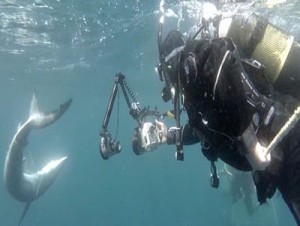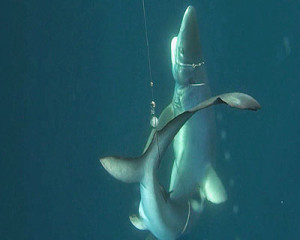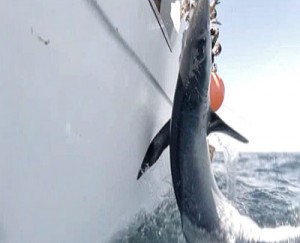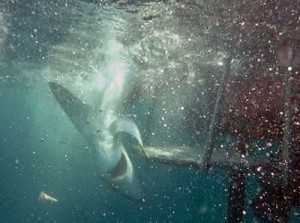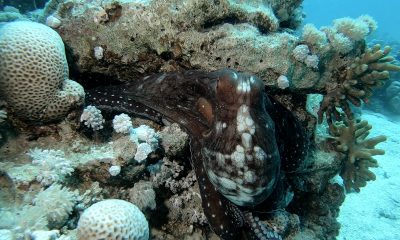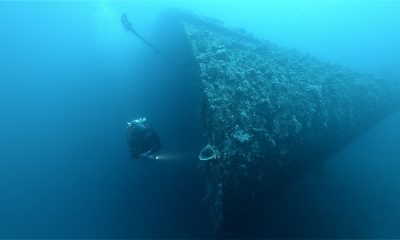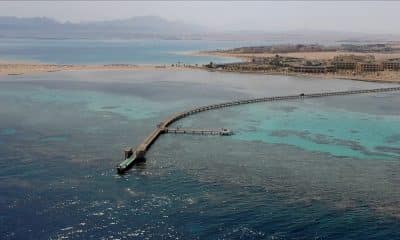Marine Life & Conservation
UK Blues – are sharks being stressed out in the name of science or to make a few quid from tourists?
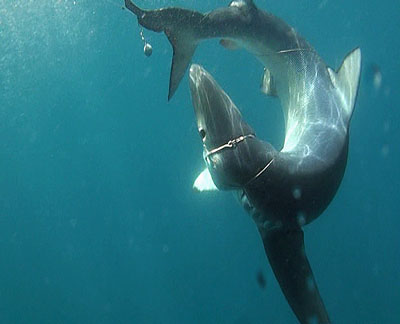
I was recently invited to a Blue Shark diving day in the UK. I am being a bit vague about where because my article really is a generic one and not aimed at anyone specifically.
The day started with laying out a trail of chum as we drifted. In this ‘scent trail’ the skipper set a line and baited hook for catching a shark with the intent of bringing it on board, showing the guests, taking measurements for research statistics and then letting it go.
Over the years as a TV wildlife filmmaker I have come across many such trips of which some are good and others really bad. Sometimes the quest for good research and care for the animals is diminished behind the need to make each trip pay financially by entertaining guests with a ‘shark experience’.
It was not long before the first shark was hooked and being played alongside the boat. A few of the guest divers were quickly in the water in the hope of seeing the shark swim past. Having tried to dive deep to safety, the shark, now nearing total exhaustion fights with the last of its energy, twisting and thrashing against the line holding it. For me this is a very sad sight and I know at least two of the divers left the water close to tears. At the same time, others thought this was great excitement.
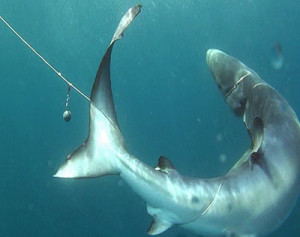 Getting wrapped in the line during this period can be harmful to the shark as well as increasing the time for lactic acid to build up in the muscle tissue which is one of the contributors to the inability of the shark to recover when released. Ideally the shark should be brought in as quickly as possible and so released the same.
Getting wrapped in the line during this period can be harmful to the shark as well as increasing the time for lactic acid to build up in the muscle tissue which is one of the contributors to the inability of the shark to recover when released. Ideally the shark should be brought in as quickly as possible and so released the same.
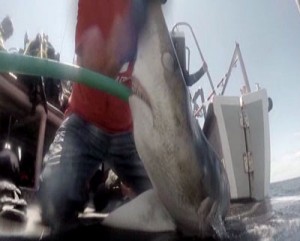 It was hauled by the hook and line over the side of the boat where a hose pipe was immediately pushed into its mouth to give a flow of water through its gills in order to help keep the shark alive while measurements were taken and people held the shark in their arms for a photo.
It was hauled by the hook and line over the side of the boat where a hose pipe was immediately pushed into its mouth to give a flow of water through its gills in order to help keep the shark alive while measurements were taken and people held the shark in their arms for a photo.
The internal skeleton of a shark is made of cartilage and connective tissue making the shark very flexible and light. The shark has no rib cage, so when it is on land its own weight can literally crush its internal organs. Hence the longer it is on the deck the more damage is done. Also when pulling a shark up and over the side of the boat, the internal organs are pulled by gravity to the lower end of the body. Generally it is far better not to bring any shark on board that is over a meter in length. Any science such as measuring and tagging should be done in the water when ever possible.
If it is necessary to bring a shark aboard then the technique recommended by many marine biologists is to use a sling at the side of the boat bringing the fish alongside and into it. Then lift it horizontally and gently onto the deck. I have done this myself and found it to be very workable and this method decreases the stress and strain on the shark. This sling can then be used to lower the shark back into the water.
At this stage there should be no reason to keep it out of the water for more that a few minutes. I have talked to shark biologists about the practice of putting the hose in its mouth and continually flushing the gills. The over-riding opinion is that this is not a good idea, or necessary, as it is likely to damage the gill tissues and so severely reduce the shark’s ability to recover. However, others are convinced that this hose pipe action does work and is necessary.
Finally the shark was released and lowered back into the water where it finned slowly while sinking out of sight into the depths. Did it live or die? We don’t know. The general consensus from the majority of marine biologists is that the rate of survival is good when care is taken to keep the shark free from over stress and physical damage.
We will forever debate the pros and cons of various opinions on how best to carry out our shark research, while at the same time, caring for the welfare of the individual animals. But in the end, it is the sharks who are paying the terrible price of pain and annihilation. To me we are simply recording statistics of the shark’s demise.
I sat on the boat after the shark was released and found myself gazing at all the incredible technology that lay in front of me. Diving equipment that allows us to explore the underwater world, computers that keep us safe from decompression, clever materials that keep us warm and dry. In the wheelhouse, the navigation equipment, the radar, the depth profilers, the coffee machine. Yet, with all this, we still find the need to put a hook into a shark’s mouth, drag it from the sea and possibly kill it all in the name of science and research. In many ways the human race has come a long way forward from the days of kill or be killed, but at the same time we seem to have kept one foot firmly in our primitive past.
So what do you think? Is it worth stressing out this magnificent creatures in this way to gain scientific research, or is the risk to their health just too high? Let us know in the comments section below.
Marine Life & Conservation
Leading UK-based shark conservation charity, the Shark Trust, is delighted to announce tour operator Diverse Travel as a Corporate Patron

 Corporate Patrons provide a valuable boost to the work of The Shark Trust. The Trust team works globally to safeguard the future of sharks, and their close cousins, the skates and rays, engaging with a global network of scientists, policymakers, conservation professionals, businesses and supporters to further shark conservation.
Corporate Patrons provide a valuable boost to the work of The Shark Trust. The Trust team works globally to safeguard the future of sharks, and their close cousins, the skates and rays, engaging with a global network of scientists, policymakers, conservation professionals, businesses and supporters to further shark conservation.
Specialist tour operator Diverse Travel has operated since 2014 and is committed to offering its guests high quality, sustainable scuba diving holidays worldwide. Working together with the Shark Trust will enable both organisations to widen engagement and encourage divers and snorkellers to actively get involved in shark conservation.
“Sharks are truly at the heart of every diver and at Diverse Travel, we absolutely share that passion. There is nothing like seeing a shark in the wild – it’s a moment that stays with you forever!” says Holly Bredin, Sales & Marketing Manager, Diverse Travel.
“We’re delighted to celebrate our 10th year of business by becoming a Corporate Patron of the Shark Trust. This is an exciting partnership for Diverse and our guests. We will be donating on behalf of every person who books a holiday with us to contribute towards their vital shark conservation initiatives around the world. We will also be working together with the Trust to inspire divers, snorkellers and other travellers to take an active role – at home and abroad – in citizen science projects and other activities.”
Paul Cox, CEO of The Shark Trust, said:
“It’s an exciting partnership and we’re thrilled to be working with Diverse Travel to enable more divers and travellers to get involved with sharks and shark conservation. Sharks face considerable conservation challenges but, through collaboration and collective action, we can secure a brighter future for sharks and their ocean home. This new partnership takes us one more valuable step towards that goal.”
For more information about the Shark Trust visit their website here.
For more about Diverse Travel click here.
Marine Life & Conservation
Shark Trust Asks Divers to help with Shark Sightings this Global Citizen Science Month

 Whether you are stuck for ideas of what to do with the kids or are off on the dive trip of your dreams. You can get involved in Citizen Science Month and help the Shark Trust by providing vital data about sharks are rays both close to home and further afield.
Whether you are stuck for ideas of what to do with the kids or are off on the dive trip of your dreams. You can get involved in Citizen Science Month and help the Shark Trust by providing vital data about sharks are rays both close to home and further afield.
In addition to reporting the sharks and rays you see on your dives, the eggcases you find on the beach, the Shark Trust is looking for some specific data from divers who are asked to report any Oceanic Whitetip and Basking Sharks.
Oceanic Whitetip Sharks
The Shark Trust are looking specifically for Oceanic Whitetip Shark sightings over the coming weeks and months. So, if you are diving anywhere in the world, please report your sightings via the website or app.
Website: https://recording.sharktrust.org/
App: Search The Shark Trust in your app store
The Oceanic Whitetip. Known for their incredibly long dorsal and pectoral fins, this species was once the most abundant oceanic-pelagic species of shark on the planet.
Large and stocky, they are grey or brown above, and white below and famous for their huge rounded first dorsal fin and paddle-like pectoral fins. The fins also highly prized within the shark fin trade. Whilst they are mostly solitary, Oceanic Whitetips do occasionally hunt in groups.
An inquisitive species, they were easy prey for fisheries. Combined with their low reproductive rate, they were inevitably at high risk of population depletion. And declines of up to 99% have been reported in certain sea areas. They are listed as Critically Endangered on the IUCN Redlist (2019).
Conservation efforts to discourage further declines include listing on CITES Appendix II and CMS Appendix I. They’re also the only species prohibited from take by all the Tuna RFMOs (Regional Fisheries Management Organisations). However, these measures do not mean that Oceanic Whitetips are not still caught – whether targeted or as bycatch – in some parts of the world. With populations declining at such a high rate, effective implementation of management measures is essential to ensure that the species can recover.
If you are lucky enough to get an image of an Oceanic Whitetip and you record your sighting on the Shark Trust app or website YOU CAN WIN! All images submitted with sightings, that also give consent to use in conservation messaging, will be in with a chance to win an Oceanic Whitetip T-shirt and mug. The competition will run until the end of “Shark Month” in July – so keep those sightings (and images) coming in.
Basking Sharks
Basking Shark (Cetorhinus maximus) season is upon us, and the Shark Trust is asking everyone to keep an eye out for these majestic giants over the summer months. If you see any, you can record your sighting to the Basking Shark Sightings database.
Each year, these mighty fish return to British waters to feed on plankton. You may see one, (or a few if you’re really lucky) from around April-October. They can be seen feeding at the surface of the water, where they look like they’re basking in the sun. Thus, their name!
Sighting hotspots around the British Isles include southwest England, Isle of Man, north coast of Ireland, and western Scotland. The Sea of the Hebrides is the most prolific sightings area in Scotland, but they have been spotted all around the coast and have even ventured into some of the sea lochs. The Shark Trust has received thousands of sightings since the Basking Shark project began, but more data is needed to truly understand what is going on with population numbers and distribution. You can help by recording your sightings this summer.
Great Eggcase Hunt
The Shark Trust has an Easter Egg Hunt with a difference for you to try. Take part in the Great Eggcase Hunt and get involved with a big citizen science project that helps shark, ray and skate conservation. And it’s an enjoyable activity for all the family.
The Shark Trust also want snorkellers and divers to record their underwater eggcase findings. Underwater records help pinpoint exactly where sharks and skates are laying their eggs and can help link to beach records. Learning the depth and substrate that they lay on also helps better understand the species.
Find out more: https://www.sharktrust.org/great-eggcase-hunt
Whether you are diving, snorkelling or exploring on the beach you can take part in Citizen Science Month and get actively involved in shark and ray conservation. Find out more: www.sharktrust.org
-

 News3 months ago
News3 months agoHone your underwater photography skills with Alphamarine Photography at Red Sea Diving Safari in March
-

 News2 months ago
News2 months agoCapturing Critters in Lembeh Underwater Photography Workshop 2024: Event Roundup
-

 Marine Life & Conservation Blogs2 months ago
Marine Life & Conservation Blogs2 months agoCreature Feature: Swell Sharks
-

 Blogs1 month ago
Blogs1 month agoMurex Resorts: Passport to Paradise!
-

 Blogs2 months ago
Blogs2 months agoDiver Discovering Whale Skeletons Beneath Ice Judged World’s Best Underwater Photograph
-

 Gear News3 months ago
Gear News3 months agoBare X-Mission Drysuit: Ideal for Both Technical and Recreational Divers
-

 Gear Reviews2 months ago
Gear Reviews2 months agoGear Review: Oceanic+ Dive Housing for iPhone
-

 Marine Life & Conservation2 months ago
Marine Life & Conservation2 months agoSave the Manatee Club launches brand new webcams at Silver Springs State Park, Florida


